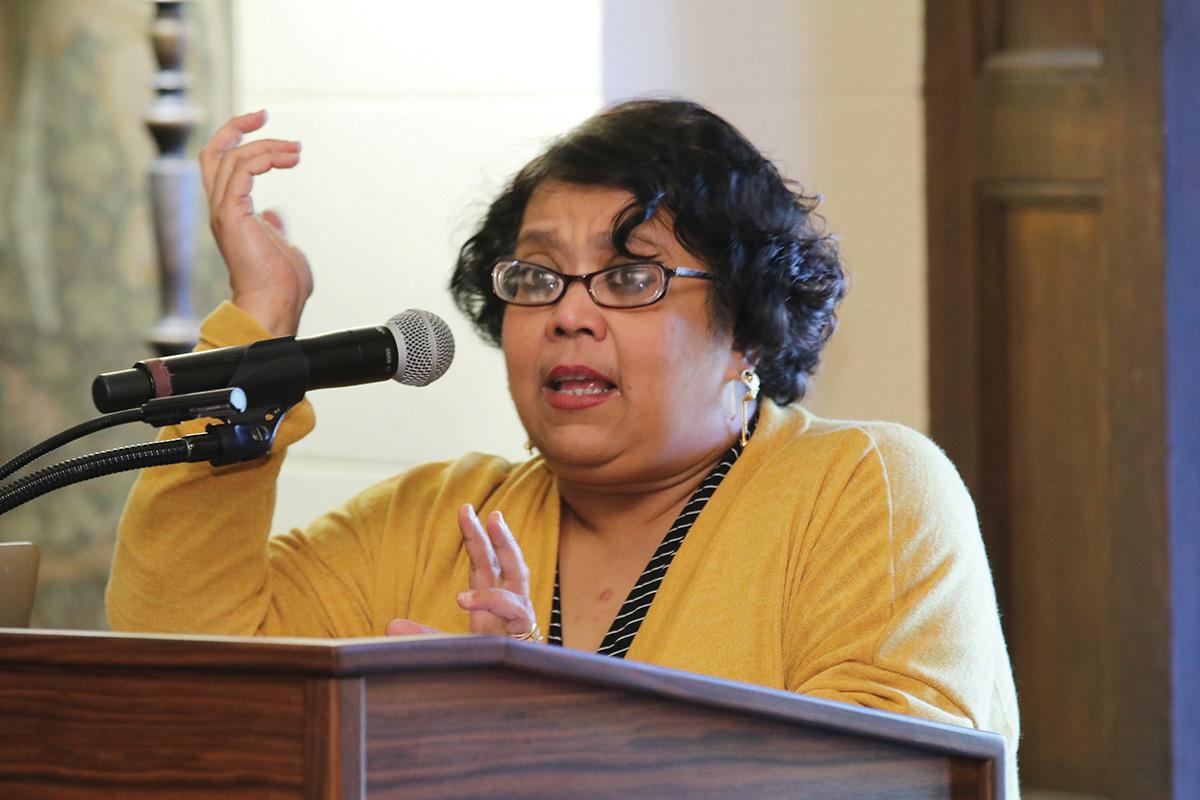
by Sangita Gopal, Associate Professor, Department of Cinema Studies
The Women of Color (WOC) Project has been a special project under the auspices of CSWS since 2005. The program is comprised of tenure-track women faculty, and our collective has approximately 50 participants, of whom about 30 are active constituents. We represent all the colleges and schools within the UO.
The group was initially formed to foster WOC in leadership positions in UO administration. It evolved over the years as a vital research, mentoring, and support network for WOC faculty who often find that they are the only one of their kind in their academic units and seek both mentorship and community from fellow colleagues. We have also functioned, informally, as a clearinghouse for archiving the particular structural and interpersonal challenges that WOC face in their research, teaching, and service in a predominantly white university. This makes us a very valuable partner in the university’s diversity, recruitment, and retention initiatives. We have frequently advocated for colleagues facing issues of climate and disenfranchisement by partnering with other units such as Center on Diversity and Community (CoDaC) and the Office of Diversity, Equity, and Inclusion (DEI).
More broadly, we have been able to bring attention to the unduly (and largely uncompensated) service tax that WOC faculty face in order to support the University’s efforts to promote diversity as a hallmark of its excellence. This severely hampers the ability of WOC to maintain a brisk pace in their research trajectory and be promoted on time. It also affects rate of tenure of WOC faculty as well as retention. Thus in 2016, we approached the University Administration with our concerns and requested that they not only audit these special challenges faced by WOC and make institutional changes to address them, but also make supporting the research agendas of WOC a priority to enhance rates of tenure, promotion, and retention.
Since then, the WOC Project has received funding from the Office of the Provost, CSWS, and other partner units on campus to support research and professional development programming for WOC faculty on campus. This summer, our funding partnership with the Provost’s office was renewed for another three years.
Programs and Impact
Currently, the WOC Project includes the following programs:
- small grants for individual projects and events across departments and schools,
- research workshops for assistant and associate professors to finish up their research portfolio or to jump-start their pipeline for post-tenure research,
- grant-writing workshops with expert consultants to review grant proposals for faculty wishing to submit applications to outside grants, and
- a fellowship competition that provides summer support to complete research projects that will have immediately measurable impacts.
As our cohort repeatedly testifies, the value of the project lies not only in the concrete mentoring and professional support that we provide, which can be measured in terms of impact, but also in the very real benefits such an intergenerational, interdisciplinary network offers its members. These range from providing feedback on research, a safe space for talking about challenges faced by WOC, and a forum for discussing how we may better support UO’s goals for equity, diversity, and inclusion based on our varied and cross-disciplinary experiences.
The community we have built is a sustaining one and all of us feels very committed to it. For example, Lynn Fujiwara, ethnic studies, in a sentiment widely shared by others associated with the project, says that the work WOC does plays a crucial role in retention. Priscilla Ovalle, cinema studies, feels it is only a project such as this that allows her to connect with colleagues across disciplines and offers a broad intersection of all experiences and challenges across all units as well as how to address these challenges in teaching, research, and departmental life.
This community is well known and, as the convener, I am often contacted by candidates who are being recruited by the University hoping to learn more about what we do and the resources we offer. We have also been sought out by graduate and undergraduate WOC who want to emulate us and be mentored by us as they build their own networks for professional success. This role-modelling is very exciting to hear, indeed, and is a measure of our critical impact.
History
The WOC Project started in 2005 as a CSWS Research Interest Group. In 2008, the center was awarded a Ford Foundation grant from the National Council for Research on Women (NCRW) to promote a leadership pipeline for Women of Color at universities. “Diversifying the Leadership of Women’s Research Centers” was meant to promote the leadership of women of color from historically underrepresented groups in the United States within NCRW and within its women’s research, policy, and advocacy member centers. CSWS and the UO Office of the Vice President for Research provided matching funds to launch the initiative.
The WOC Project was first headed by Professor Lynn Fujiwara, who was one among a very small group of tenured WOC faculty at UO at the time. “The project specifically designed for CSWS was to address the current and historical absence of women of color in leadership positions at the center,” said Fujiwara.
From 2008-2016, the WOC Project developed under the leadership of Fujiwara, Lamia Karim, Gabriela Martinez, and myself, who all served as associate directors of CSWS. After the center restructured staffing in 2016, CSWS no longer had an associate director position so there was no one to manage the WOC project. This was disappointing news since we had worked so hard to develop this cohort and it had served such a crucial role in research, promotion, and retention of WOC on campus. We approached President Schill to discuss the future of the special project, and in 2017 we received funding from the Office of the Provost and other campus units to continue their mission in partnership with CSWS.
—Sangita Gopal is a professor of cinema studies and convenor for the CSWS Women of Color Project.

